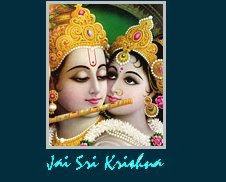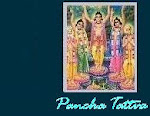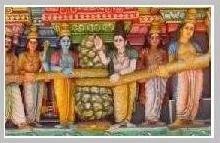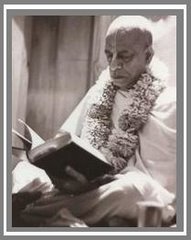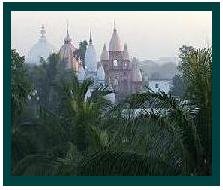
Srila Bhaktivinoda Thakura in his Sri Caitanya Siksamrita describes the demons killed during Sri Krishna's Vrindavana pastimes and the anarthas (unwanted things) that they represent.
- Putana - the pseudo guru
- Sakatasura (the cart demon) - carrying the burden of a cart-load of old and new bad habits, lethargy and vanity.
- Trinavarta (the whirlwind demon) - false pride which comes from material scholarship, which leads to bogus philosophies.
- Deliverance of Nalakuvara and Manigriva (breaking the twin arjuna trees) - Arrogant pride which comes from puffed-up prestige, which is rooted in a madness for wealth.
- Vatsasura (the calf demon) - a childish type of mentality which gives rise to a type of greediness which results in a wicked type of mischievousness.
- Bakasura (stork demon) - Cunning duplicity, deceptiveness and false types of behavior.
- Aghasura (the snake demon) - Cruelty and violence. Brahma-vimohana Pastime (Lord Brahma steals the cowherd boys and calves) - mundane activities and speculative scholasticism.
- Dhenukasura (the ass demon) - gross materialistic intelligence, ignorance of spiritual knowledge.
- Kaliya (chastising the Kaliya serpent) - brutality and treachery. Extinguishing the Forest Fire - Quarreling amongst Vaishnavas.
- Pralambasura (killing the Pralamba demon) - lusty inclinations; desire for personal gain and honor.
- Second Forest Fire - disturbance of religious principles and interference with religious people who are atheist. Brahmanas Performing Sacrifice - indifference toward Krishna caused by pride because of one's status (position) in varnasrama.
- Overcoming the Pride of Indra - demigod worship, and the tendency to think "I am Supreme."
- Nanda Maharaja Captured by Varuna - thinking that spiritual life can be enhanced by intoxication.
- Nanda Maharaja Swallowed by Vidyadhara (the snake) - rescuing the truth of Krishna consciousness from being swallowed by the impersonalists.
- Sankhacuda (killing the conch-shell demon and getting the jewel that was stolen by him) - proneness toward acquiring name and fame, and desire for sensuous enjoyment, under the plea of devotion.
- Aristasura (the bull demon) - pride arising from indulging in false religions invented by cheaters which causes neglect of devotional service (bhakti).
- Kesi (the horse demon) - The feeling that "I am a great devotee and spiritual master." Vyomasura (the demon in the sky) - associating with thieves and other rascals, and with people who put themselves forward as avataras.
Bhaktivinoda Thakura says: "The devotee who worships the holy name should first petition the Lord for the strength to cast out all these unfavorable tendencies and should pray thus before Lord Hari ( Balaram - Nityananda ) on a daily basis.
By doing this regularly, the devotee's heart will eventually become purified. Sri Krishna has killed a number of demons which may arise in the kingdom of the heart, so in order to destroy these problems, a devotee must cry very humbly before the Lord and the Lord will then nullify all contaminations."

 "Temporary duties are short lived. The soul's temporary duties are not performed in all situations and all times. For example: a brahmana's brahmana nature, a ksatriya's ksatriya nature, and other like natures also, are manifested because of a particular cause. When the cause ceases to be, these natures vanish. A person may in one birth be a brahmana and in the next birth an outcaste. Therefore the duties of the brahmana caste are temporary. They are not the original duties of the soul. Therefore in reference to temporary duties the phrase 'own duty' is only a figure of speech. That is why in every birth a soul's 'own duty'changes. However, in none of these births does the soul's eternal duty ( Sanatana Dharma ) ever change. This eternal duty is the soul's true 'own duty'. Temporary duties are all short lived.
"Temporary duties are short lived. The soul's temporary duties are not performed in all situations and all times. For example: a brahmana's brahmana nature, a ksatriya's ksatriya nature, and other like natures also, are manifested because of a particular cause. When the cause ceases to be, these natures vanish. A person may in one birth be a brahmana and in the next birth an outcaste. Therefore the duties of the brahmana caste are temporary. They are not the original duties of the soul. Therefore in reference to temporary duties the phrase 'own duty' is only a figure of speech. That is why in every birth a soul's 'own duty'changes. However, in none of these births does the soul's eternal duty ( Sanatana Dharma ) ever change. This eternal duty is the soul's true 'own duty'. Temporary duties are all short lived.




